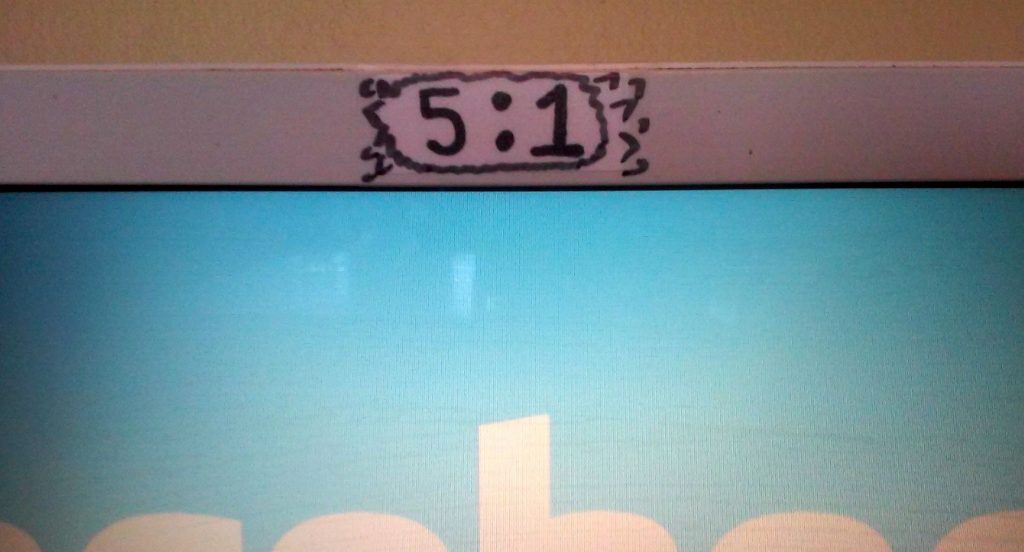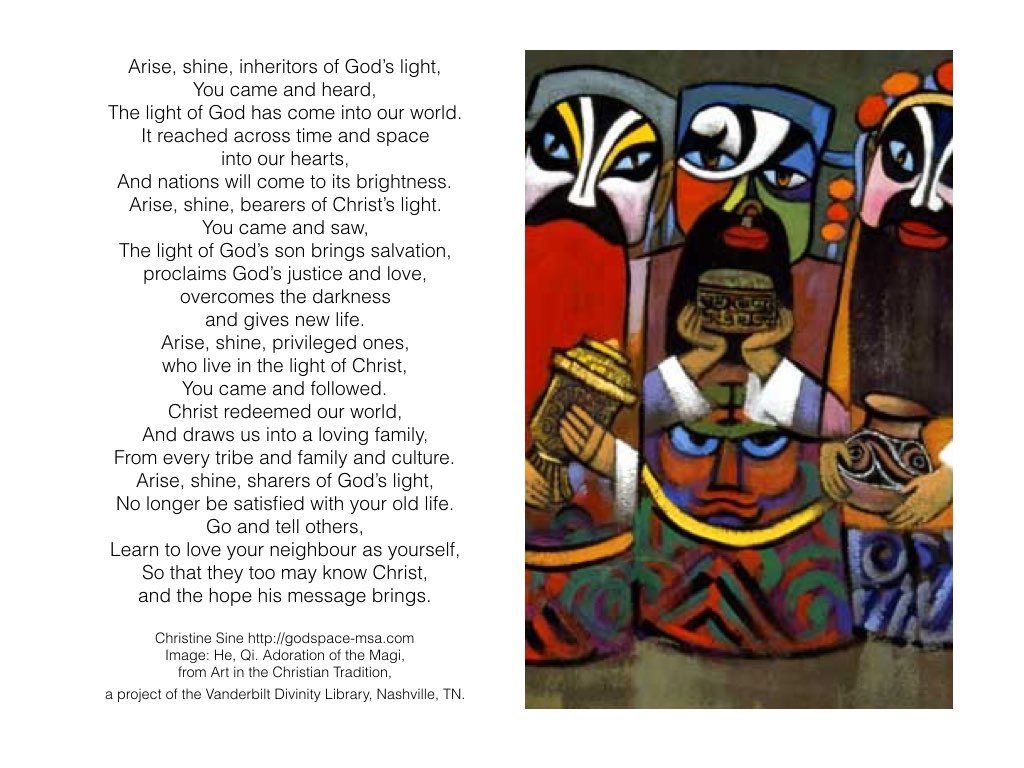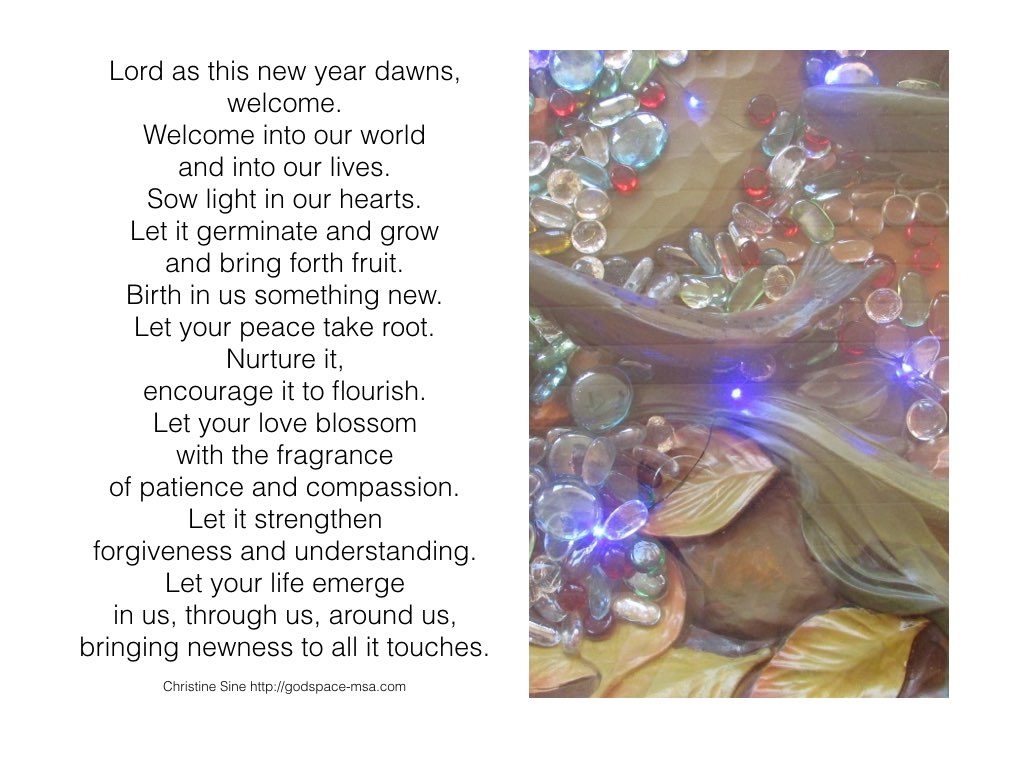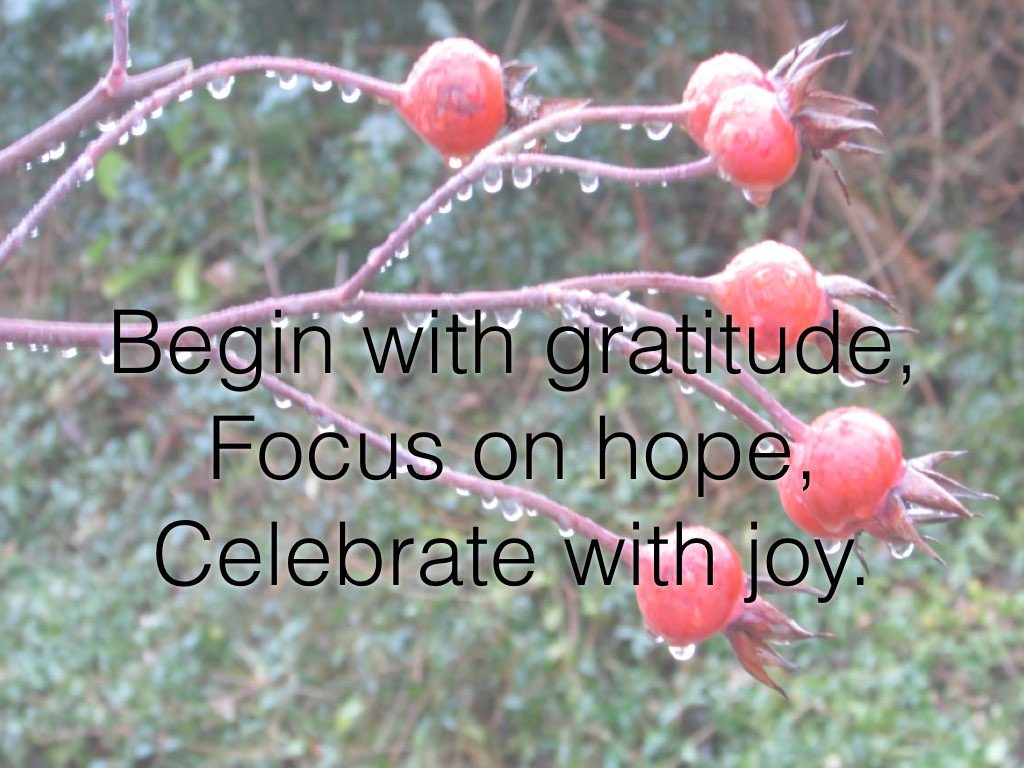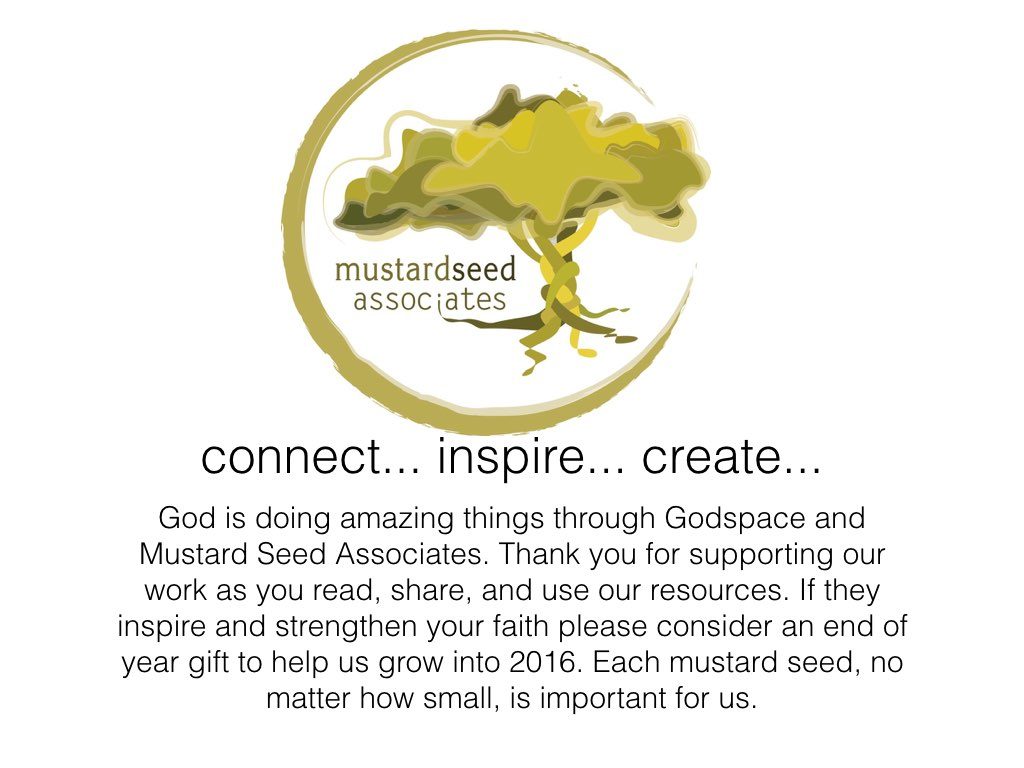We are poised for an interesting New Year. Many important issues are being discussed in a wide variety of places. One of the hubs for discussion, for many, is Facebook.
What do Jesus, John Gottman and Explosives Have to do With Facebook?
Facebook has great potential to bring a wide variety of viewpoints to the same place. However, I think we may be shooting ourselves in the foot with our approach to online conversation.
On Facebook, many of us are waging a war of ideas that are pushing relationships farther and farther apart. We do this by looking for targets online in the form of ideas we disagree with; then, we throw our biggest argument bomb from a safe distance, wait for the dust to clear and shoot anything that still moves. Ah, the sweet smell of factual superiority.
Can anyone relate?
To be sure, the issues in question are real and important. The presidential race, racial conflict, systemic oppression, immigration, individual rights, religious tension, etc. They all matter. The problem is, we may not have anyone left around us after we have all made our points. I am guilty of this, and I want to seek an alternative approach, an approach that allows us to remain in relationship amidst the conflict. I believe the accounts of Jesus’ life from the Bible and research from John Gottman offer a healing alternative to the online arms race.
A Different Way to Engage: Jesus’ Life
The societal, political and religious climate during the time of Jesus’ life was violent and polemic – clearly paralleled in our time. The “Peace of Rome” came with a loss of local identity and plenty of violence in its imposition. Religious leadership battled over ideas. Marginalized people groups were forgotten. Society was built around stratified, patriarchal leaders with significant disparity between the haves and have-nots.
Sound familiar?
Into this world, a new leader was born. Jesus’ life offered an alternative to the “might makes right” approach. The circumstances of his birth alone reflect the disparity between Jesus and political leaders in his day. While they were birthed in nobility, he was birthed in humility. While the “right people” showed up for leaders’ heralded births, foreigners and the lower class welcomed Jesus, surrounding him in a trough where animals ate. At the end of his life, he would be executed for his claim to religious and political leadership – a claim he backed not with a sword, but with service, love and affection. With humble beginnings, Jesus lead a life often characterized by disarming weaponized relationships. In the end, he preferred to maintain relational availability rather than enforce his ideology through violence.
Current Research: Gottman’s 5:1 Ratio
John Gottman, renowned relational researcher, studies what keeps us in relationships. He has found in his research that there is a “magic” ratioof positive interactions to negative interactions of 5:1 in healthy, stable relationships. With it, he can predict divorce with surprising accuracy. It is noteworthy that he does not exclude the need for conflict in his ratio; in fact, conflict is important for growth.
What Gottman points out is that there is an amount of positive investment necessary for a relationship to weather the storms of conflict. When there is enough positive investment to handle the conflict, he calls this “Positive Sentiment Override.” My unscientific assessment of the Facebook world is that we need to, collectively and individually, move our ratio towards the positive if we want to stay in relationship.
A Tool for the New Year
So, in light of polarizing Facebook conversations, I am going to try to post with Gottman’s research in mind. Five posts that invest in care, love, humor, generosity, forgiveness, etc. for every one critique. Honestly, I do not know exactly how that looks yet. I will start by taping this to the edge of my computer screen…
Taking my cue from Jesus’ life, I want to prioritize maintaining connection over winning arguments. I think the 5:1 concept may help me.
What Ideas for Improving Online Relationships Do You Have?
Tomorrow evening we will celebrate the Eve of Epiphany, the last feast of Christmas. This celebration commemorates the arrival of the Magi, the wise men from the East who brought gifts to the infant Jesus. We have watched and waited through Advent, we have rejoiced through Christmas at our Saviour’s birth and now we are asked to follow, to recognize the revelation of Christ in our midst and journey into the new life he offers us. We like the Magi, are encouraged to come and see, come and follow, go and tell others.
I wonder at their improbable presence in the Christmas story, at their capacity to recognize the divine lying in the gloom of poverty.
But where are the Jewish sages to join them around my tiny creche? Where are the religious leaders who longed for the Messiah? They were invited. The star led the magi to Jerusalem. News of Israel’s Saviour reached the holy land on the lips of foreigners. The priests were able to name the place of the Messiah’s birth from prophecy and pointed the pagans in the right direction. But why – why – did none follow? (From Invitation to Epiphany: Tabitha Plueddemann Mosaic Bible)
What is your response?
Think about the implications of the Christmas story for your life over this next year. How has your journey towards Christ and the light of his presence changed you this Christmas season? Are you still in Jerusalem with the religious leaders, unwilling to follow a saviour who wants to turn our lives and our world upside down? Or have you joined the Magi and journeyed onwards to Bethlehem and beyond?
Every Christmas we meet with Christ in a new way, a way that should mean death to our old selves and new birth into the eternal life of God. Epiphany is an invitation to follow the Christ that we have encountered in new ways over the Christmas season and beginning a new journey.
For the magi their journey towards the Christmas star was life changing. They could no longer go back to their old gods. They could no longer walk the old paths or be satisfied with the old life. They had met the Messiah and recognized him as light to the world not just as God’s glory revealed to Israel. They had seen him as God’s redeemer to foreigners as well as to the Jews. And as a result they did not go back to the religious leaders of jerusalem after their revelation – they went home by a different way.
What is your response?
Listen to the song below and spend some time reflecting on your own journey beyond Bethlehem. What new journeys are we embarking in that show we have been touched by God’s light? How can we better follow him into a new journey that leads us and others towards God’s eternal light?
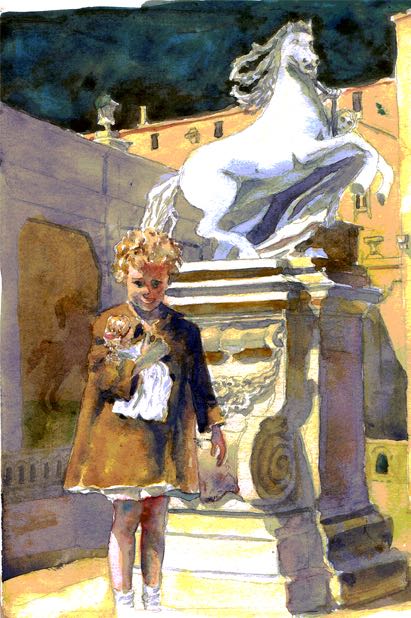
Lynne Baab at age four, watercolor by Dave Baab
by Lynne Baab
What do I need to remember as I enter 2016? What do I need to embrace for a fresh start in a new year? Here are two foundational ideas or postures that I’m hoping will shape 2016 for me. “Posture” implies a way of standing, and I hope I can stand firm in these two truths.
- I am beloved. Henri Nouwen talks about being beloved more vividly than anyone else I’ve read. In his wonderful book, The Life of the Beloved, he writes:
“Becoming the Beloved means letting the truth of our Belovedness become enfleshed in everything we think, say, or do. . . . What is required is to become the Beloved in the commonplaces of my daily existence and, bit by bit, to close the gap that exists between what I know myself to be and the countless specific realities of everyday life. Becoming the Beloved is pulling the truth revealed to me from above into the ordinariness of what I am, in fact, thinking of, talking about, and doing from hour to hour” (pages 45 and 46).
I love that he discusses the “gap that exists between what I know myself to be” as God’s beloved and “the countless specific realities of everyday life.” God’s love is described so vividly in the Bible, and it pours into my life in so many ways, yet so often I don’t feel it or dwell in it. It’s so easy to feel self-critical. The task, according to Nouwen, is to pull “the truth revealed to me from above into the ordinariness” of daily life.
This is not necessarily easy, and I’m so glad he affirms the challenge. In the middle of the quotation above, he writes that this “entails a long and painful process of appropriation or, better, incarnation.” In 2016 I want to grow in beginning each day from a place of belovedness that flows into daily life. I want to see belovedness incarnated in my life more and more each day. I am God’s beloved child and I want to live that way.
- I am sent. My second foundational attitude or posture for 2016 comes from the benediction Pastor Doug Kelly says most Sundays at Seattle’s Bethany Presbyterian Church: “You go nowhere by accident. Everywhere you go, God has a purpose for your being there.”
Our word “mission” comes from the Latin “missio,” which means sent. In his prayer for all believers, Jesus says, “As the Father sent me into the world, so I send you into the world” (John 17:18). We have been sent into the world as Jesus was sent, so it’s true that we go nowhere by accident. God has a purpose for us wherever we go, even in the moments when that purpose seems quite small or insignificant.
What is that purpose? Here are some of the ways I would describe it:
To be faithful to God’s call each day.
To show God’s love to the people around me as much as possible.
To be God’s agent of reconciliation in as many settings as possible.
To abide in Christ so that I can bear the lasting fruit God wants me to bear.
I want to go into 2016 knowing I am beloved and knowing I have been sent to exactly the place where I am. I want to follow God’s guidance and fulfill God’s purposes as much as I can, resting in the fact that I am God’s beloved child.
For each of you, as you enter 2016, here are some questions to reflect on:
- In what settings do you know deep inside that you are God’s beloved? Make plans to go to those places often in 2016.
- What are the biggest obstacles to knowing you are beloved? With whom could you talk and pray about those obstacles?
- If someone asked you, “what is your purpose in Christ,” how would you answer?
- What are the biggest obstacles you experience to knowing you go nowhere by accident? With whom could you talk and pray about those obstacles?
NOTE: As an Amazon Associate I receive a small amount for purchases made through appropriate links. Thank you for supporting Godspace in this way.
Today is Holy Name Day. Just like every Jewish boy, Jesus was circumcised and formally named on the eighth day of his life, and so, one week after Christmas Day, while we are still celebrating the wonder and the joy of the Saviour who came to dwell amongst us, we celebrate this occasion. In Jesus day, a name was far more important than it tends to be today. Introducing a person just about gave you their whole genealogy and sometimes even reflected their personality.
As a celebration of then naming of Jesus why not get together with a group of friends for a party maybe not today but after those New Year hangovers have settled. This could be a good way to shake off those post Christmas blues. Bring a name book with you. Look up the names of each person in your group and discuss their meanings. Get each person to share the story of why they were given that name. Then ask the question: In what ways does your name reflect the call that God has placed on your life? Some of you may like to consider a new name that reflects what you believe is God’s call on your life. One friend of mine changed his name from Bill to Will because he felt it better reflected his desire to use his life “doing the will of God.”
Next spend time discussing the names of Jesus. Get each person to write down the names that they remember as being applied to Jesus in the Scriptures. You might like to have a competition to see who can think of the most names. Or you could write a poem or song that reflects these names. End your time with a discussion about how you could represent these different aspects of who Jesus can be to those who live around you.
Names matter. What we call Jesus matters. If we see him as Lord it can imply a distant and unapproachable God who is unconcerned for human suffering. If we call him servant, we see him down in the dirty places of our world and we want to join him. I have written about this previously in the post: Sometimes I want to Call God Mother. Think about it for a few minutes and then listen to this powerful 5 minute sermon by Rev SM Lockridge entitled That’s My King.
Or you might like to use this liturgy to reflect on:
May we join in the dance of God this day,
And sing our praises to Christ our Saviour.
Let us celebrate the joy of Christ’s birth,
And shout aloud: Emmanuel, God is with us!
Pause to light the Christ candle and remind yourself of the many names by which Christ is known in the Bible. Allow time for each person to call out the names that are most meaningful to them)
Lord Jesus Christ,
A thousand names cannot confine you
You are King of Kings and Lord of Lord
Wonderful counselor, Prince of Peace,
Saviour, Restorer and Redeemer
You are the Lamb who was slain,
Lord Jesus Christ,
A thousand names cannot confine you
God of justice and truth how can we know you?
You are majestic and holy, abounding in love and faithfulness
You are the source of life, our provider
You walk beside us as friend
Lord Jesus Christ,
A thousand names cannot confine you
God of glory, God of power you care for the vulnerable
Protector of widows and orphans,
Compassionate to the poor, comforter of the downcast,
You heal our diseases and bring us wholeness,
Lord Jesus Christ,
A thousand names cannot confine you
God in whom we trust, you are always with us,
You are all things good, known yet unknowable,
You are the way, the truth and the life,
We worship you.
Lord Jesus Christ,
A thousand names cannot confine you
Read the scriptures for the day from the daily lectionary
Lord Jesus Christ, your name is proclaimed in all the earth.
You were God almighty yet you made yourself nothing
You came as a vulnerable child to live amongst us.
You were God all powerful
Yet you came as a humble servant
You were faithful as a son,
You went through death so that we might find life
Your blood was shed so that we could be redeemed
Your body was broken so that we might be made whole
Therefore God has exalted you and given you the name above all names
So that one day all peoples will proclaim you
As Jesus Christ the Lord
God who calls us all by name
Have mercy upon us
Christ who invites us to share life as one family
Have mercy on us
Spirit who welcomes us home together into God’s eternal world
Grant us peace
Our Father who art in heaven hallowed be thy name. Thy kingdom come, thy will be done, on earth as it is in heaven. Give us this day our daily bread and forgive us our trespasses as we forgive those who trespass against us. Lead us not into temptation but deliver us from evil, for thine is the kingdom the power and the glory, for ever and ever. Amen.
Jesus, as members of your family, help us to proclaim your names in all the earth.
Make us instruments of your life today.
Through our words and actions help us to proclaim you as saviour and redeemer to all peoples.
Lord make us instruments of your love today.
Where there is war may we proclaim you as the Prince of Peace.
Lord make us instruments of your peace today.
Where there is despair may we proclaim you as the God of all comfort.
Lord make us instruments of your comfort today.
Where there is sickness may we proclaim you as the great physician.
Lord make us instruments of your healing today.
Where there is oppression may we proclaim you as the God who brings freedom
Lord make us instruments of your freedom today
Where there is hunger may we proclaim you as the God of abundant provision.
Lord make us instruments of your generosity today.
Jesus may we be proclaimers of your names through all the earth.
Lord make us instruments of your kingdom today.
The Wonderful Counsellor guide you,
The Mighty God protect you,
The Everlasting Father be with you.
The Prince of Peace inspire you,
And the blessings of God be upon you, now and evermore.
Amen
The prayer The Wonderful Counsellor guide you… is from David Adam, The Rhythm of Life, (Morehouse Publishing 1996,) p54
NOTE: As an Amazon Associate I receive a small amount for purchases made through the above link. Thank you for supporting Godspace in this way.
Yesterday I blogged about 3 new habits for 2016. As I reflected on that this morning I realized I wanted my new year’s prayer for 2016 to reflect that as well. A little positive reinforcement is one way to inculcate new habits into our lives. Through gratitude, hope and joy I want to see the new life of God emerge in and around me this year in new ways and I want to do what I can to make it happen.
It is not by accident that my metaphors here are gardening ones. As the new year dawns I start to think about the garden and what I want to plant and nurture into life.
I know my dreams and hopes will be bigger than my ability to fulfill them but their inspiration will give birth to a new and nourishing garden – just as I hope this prayer will too.
What are you hoping for in 2016?
Its only a couple of days until the end of the year and like many of us I am reflecting on the year that has passed and thinking about what I want to accomplish in the coming year.
This year I am not setting new year’s goals or working on a set of resolutions. Such things are made only to be broken. Instead I am hoping to establish a few new habits that I hope will stick with me throughout the year. I thought you might like to join me.
- Begin with gratitude. Part of my Sabbath discipline for many years has been asking myself “what are you grateful for”. However I have realized that there is a big difference between looking back with gratefulness and entering the day with an attitude of gratitude. Recognizing that each new day is a unique gift from God is something that should have us giving thanks continually. Deliberately looking with gratitude at each moment and learning to savour everything from the rain shrouded dawn of a winter’s day to the laughter of a friend as a gift from God, can be life transforming.
- Focus on hope. We journey towards a hope filled future, a future in which all things will be transformed by our loving God into wholeness and newness. Yet we rarely express that. For me, it is easier to live in the presence of negativity, to see the clouds and not the sun. To live as children of hope and faith is an intentional decision that we can make each day.
- Celebrate with joy. We need to live with less goals and more celebration. Goals restrict us. They can make us feel that success and fulfillment are always a little beyond our grasp. They often set us up for failure. A friend on mine told me years ago that she always begins her prayer time by looking for the “joy spots”, asking herself where is God already at work and how can I join in? Intentionally looking for the hope giving, joy filled activity of God that is already present in every moment and every event, is inspiring and changes our whole attitude towards life.
So what are the new habits you hope to incorporate into your life journey in 2016?
As an Amazon Associate, I receive a small amount for purchases made through appropriate links.
Thank you for supporting Godspace in this way.
When referencing or quoting Godspace Light, please be sure to include the Author (Christine Sine unless otherwise noted), the Title of the article or resource, the Source link where appropriate, and ©Godspacelight.com. Thank you!



